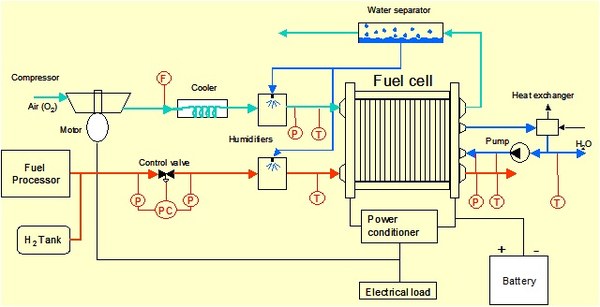PEMCell
CICYT DPI2005-05415.
Objectives
- Study and design of fault diagnosers in fuel cell-based systems.
- Development of fault-tolerant controllers for fuel cell-based systems.
- Design and implementation of a software tool for monitoring (diagnosis and fault-tolerant control) fuel cells.
Summary
Fault-tolerant control is a new concept of this millennium that aims to develop control systems that increase the availability and safety of the controlled system. The idea behind FTC applied to system automation is to prevent simple failures from becoming more serious faults by giving the system robust and reliable capabilities to tolerate malfunctions while meeting operating requirements. FTC integrates multiple disciplines of recent research and technological development, such as embedded systems, real-time and distributed control systems, failure mode and effects analysis, failure severity analysis, fault detection and isolation (FDI), adaptive and robust control, predictive control, discrete event systems, classification systems, hybrid systems, etc.

Results Achieved
Study and design of fault diagnosers in fuel cell-based systems. Algorithms have been developed to evaluate the diagnosability of systems by integrating structural analysis and observability techniques. Algorithms for sensor placement have also been studied to diagnose the maximum number of faults that can occur in a system (applied to fuel cells). Finally, fault detection and diagnosis methodologies have been designed, incorporating hybrid techniques.
Development of fault-tolerant controllers for fuel cell-based systems. Algorithms have been designed to evaluate the system’s recoverability after a failure using constraint propagation and set techniques. A new methodology for corrective actions has also been developed, consisting of a bank of controllers and selecting the controller that meets control requirements according to the failure produced. Finally, MPC has been used to design fault-tolerant actuator systems, applied in simulation to a fuel cell.
Design and implementation of a software tool for monitoring (diagnosis and fault-tolerant control) fuel cells. A fuel cell benchmark producing 500 W of power has been set up with the necessary sensors for fault detection and diagnosis. The system includes acquisition, control, and fault diagnosis software based on LabView. Additionally, a set of controlled failures has been incorporated into this benchmark. Finally, results from simulations and experiments of the diagnostic system and fault-tolerant control system have been obtained.
Notable Publications
- Nejjari, F., Perez, R., Escobet,T. and Travé-Massuyès L. “Fault diagnosability utilizing quasi-static and structural modelling”. Mathematical and Computer Modelling, vol 45 (5-6):606-616,
 <doi:10.1016/j.mcm.2006.06.008>, 2007.
<doi:10.1016/j.mcm.2006.06.008>, 2007. - Ingimundarson, A., Stefanopoulou, A.G., McKay, D.A. “Model based detection of hydrogen leaks in a fuel cell stack”. IEEE Transactions of Control System Technology, vol. 16 (5):1004-1012, <doi:10.1109/TCST.2007.916311>, 2008.
- Puig, V., J. Quevedo, T. Escobet, F. Nejjari and S. de las Heras. "Passive Robust Fault Detection of Dynamic Processes Using Interval Models". IEEE transactions on control systems technology, vol. 16 (5):1083-1089, <doi: 10.1109/TCST.2007.906339>, 2008.
- Ingimundarson, A., Bravo, J.M., Puig, V., Alamo, T. and Guerra, P. “Robust fault detection using zonotope-based set-membership consistency test”. International Journal of Adaptive Control Signal Process,23 (4):311-330, <doi: 10.1002/acs.1038>, 2009.
- Escobet, T., Feroldi, D., de Lira, S., Puig, V., Quevedo, J., Riera, J. and Serra M. “Model-based fault diagnosis in PEM fuel cell systems”. Journal of Power Sources, 192(1):216-223, 10.1016/j.jpowsour.2008.12.014, 2009.
- Rosich, A., Sarrate, R., Puig, V., Escobet. T. “Efficient Optimal Sensor Placement for Model-based FDI using an Incremental Algorithm”. 46th IEEE Conference on Decision and Control, <doi:10.1109/CDC.2007.4434636>, December 2007, p. 2590-2595.
- Puig, V., Rosich, A., Ocampo, C. “Fault-Tolerant Explicit MPC of PEM Fuel Cells”. 46th IEEE Conference on Decision and Control, <doi:10.1109/CDC.2007.4434636>, December 2007, p. 2657-2662.
Share: